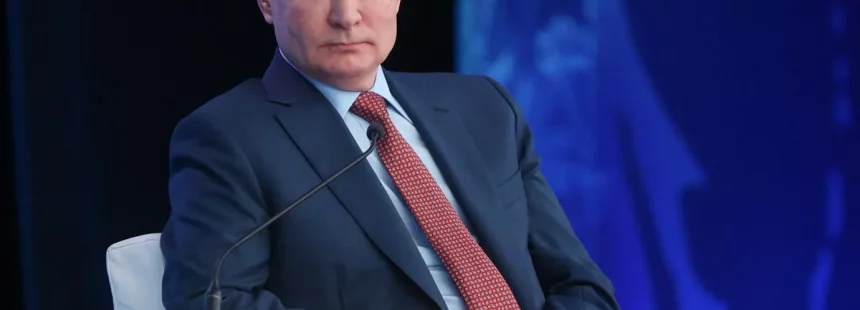

This article is a reprint. You can see the original HERE.
By Marcus Kolga
“Marcus Kolga is the founder of DisinfoWatch and a senior fellow at the Macdonald-Laurier Institute and CDA Institute in Ottawa.
While world leaders gathered virtually this month to discuss the surge of authoritarianism in recent years, Ukraine is focused on defending its sovereignty and territory against more than 100,000 troops and heavy weapons that Russian President Vladimir Putin has mobilized along its borders.
While questions abound over whether this invasion-sized force will attack, Kremlin-supported separatists have already been shelling and firing at positions inside Ukraine every day, helping to advance Mr. Putin’s goal of transforming Ukraine into a compliant, autocratic vassal state like Alexander Lukashenko’s Belarus. Despite these efforts, Ukraine has withstood the Kremlin’s intimidation since 2014, when Russian forces invaded and illegally annexed Crimea.
Over the past 20 years, Mr. Putin has also demonstrated that diplomacy – in the form of concessions, deals or outright appeasement – only emboldens his authoritarian ambitions at home and neo-imperialism abroad. Costs in the form of sectoral and personal sanctions against the oligarchs who enable Mr. Putin and the projects they profit from, such as the Nord Stream gas pipeline, are immediate measures that can be taken to build long-term credible deterrence. Additional support in the form of military training and the supply of defensive weapons to Ukraine would also force Mr. Putin to recalculate the risk of invading his neighbour.
However, recent reports about Western leaders making potential concessions to Mr. Putin have raised concerns in Eastern European capitals and Ukraine. The U.S. is reportedly set to “press Ukraine to formally cede a measure of autonomy within its eastern Donbas region,” which would represent a victory for Mr. Putin: Any autonomy granted to parts of occupied Donbas would be quickly exploited by Moscow to annex that territory.
Meanwhile, General Wayne Eyre, Canada’s Chief of the Defence Staff, said Canada will not deploy any additional troops to Ukraine, based on concerns about how additional Canadian troops might be perceived by the Kremlin. He made his comments after Mr. Putin’s warning that any new deployment by Western allies to support Ukraine would cross a “red line.” Canada’s position could risk demonstrating to Moscow that geopolitical thuggery works.
A proposed high-level meeting between Russia and select members of NATO about the future of the transatlantic alliance has raised further concerns. It’s not clear whether Canada, which is leading NATO’s Enhanced Forward Presence mission in Latvia and has 200 military trainers in Ukraine, was invited to participate.
Estonian Prime Minster Kaja Kallas recently had to remind allies that “Russia must also not be given any say in how NATO organizes the defence of its territory.” Meanwhile, former Lithuanian foreign and defence minister Linas Linkevicius warned that Russia’s intentions “are well-known, they were always trying to split, divide, marginalize, so that’s nothing new.”
And indeed, last Friday, the Russian Ministry of Foreign Affairs sent two lists of security demands to the United States and NATO, which included a Russian veto on NATO expansion and the removal of all NATO infrastructure from Central and Eastern Europe. While Mr. Putin knows that most of his demands will be unacceptable, his actual intent may be to spur dissent within the alliance – and in the worst case, exploit the rejection of his demands as a pretext for war.
“Mr. Putin already invaded Ukraine once. To deter him requires a meaningful demonstration of support for Ukrainian sovereignty and immediate sanctions on the oligarchs who enable him,” Garry Kasparov, a Russian opposition leader and the chairman of the Renew Democracy Initiative, told me. “Appeasement and negotiation only encourage Putin, and signals to him that threats and confrontation work.”
He added: “Canada has a tool to immediately deter Putin in the form of Magnitsky sanctions, and there are some very high-profile Kremlin oligarchs whose Canadian assets should be targeted.”
Mr. Putin needs to create a perpetual Cold War-style conflict in order for his government to remain relevant – both for Russian voters and geopolitically abroad. The post-Cold War triumph of freedom and democracy over Soviet totalitarianism was a victory for the millions held captive by Soviet occupation and repression; for Mr. Putin, however, the collapse of the Soviet Empire was “the greatest geopolitical catastrophe in the 20th century.”
His ultimate aim is the restoration of Russia’s Soviet-era imperial status and the defeat of Western liberal democracy – starting in Ukraine.
If Canada, the United States and our allies genuinely wish to champion our shared democratic values, that battle must begin by defending aspiring democracies like Ukraine. Only talking about democracy won’t cut it. Like any schoolyard bully, if we give Mr. Putin an inch, he will take miles. He will only stop once he’s confronted with significant and painful consequences for his actions.”

